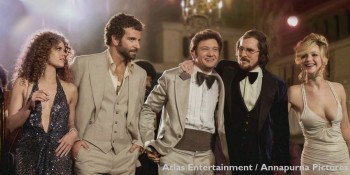All too often, Academy Award-nominated films suffer from an air of superiority, or worse, pretension. I always look back on movies like The English Patient or, worse, Crash as the pinnacle of self-righteous awfulness the Academy heralds from time to time.
That’s why it is so refreshing to be able to say that, above all else, American Hustle, the fast-paced and visually striking look at con artistry in the 1970s, is a genuinely fun movie. You may not walk out of the theater shaken to the very depths of your soul, but you will be smiling.
We’re first introduced to our protagonist, a pudgy, balding con man named Irving Rosenfeld, as he stands in front of a hotel mirror meticulously combing, styling, and gluing on an epic toupee. It’s an opening scene for the ages, staged by director David O. Russell, and is an instant tutorial on the character we’re about to follow for the next two hours. Irving, played with usual greatness by Christian Bale, is a man who puts appearances before all else: he doesn’t necessarily care that he has a beer belly or a bald dome, but he sure as hell isn’t going to let that stop him from walking into a room and owning it instantly.
The opening scene sets us up stylistically and thematically for what is to follow: a zany, kinda-sorta-ripped-from-the-headlines tale of double- and triple-crossing, government embezzlement, and good, old-fashioned, white-knuckle suspense. Irving and his partner, Sydney Prosser (Amy Adams), get pinched in a loan shark scam. In order to save their tails, they must work under the direction of hotshot FBI agent Richie DiMaso (Bradley Cooper) to entrap politicians in money laundering schemes.
Russell’s direction, equally fluid and unobtrusive, keeps the action moving forward while knowing when to slow down just long enough in some scenes to bring a small sense of gravity to the situation. The triangular relationship between Irving, Sydney, and Richie is far from a traditional “love triangle,” but under Russell’s steady hand, the interplay among these three does carry enough weight to make the viewer actually care about what happens.
For the second year in a row, Russell has orchestrated one of the most impressive feats I’ve seen in movies: his film’s actors have scored Academy Award nods in all four major acting categories (following last year’s slightly-overrated Silver Linings Playbook). Bale and Adams shine brightest in Hustle, while Cooper more than holds his own.
The final key to the acting piece is Jennifer Lawrence, who plays Irving’s long-suffering (and suffering-causing) wife. Lawrence’s work over her career has always been spectacular, so her nomination this year is not surprising, but in contrast to the work of her three co-stars, Lawrence seems to be phoning in this performance. It doesn’t take away much from the film, but it does leave the viewer wishing her role had more substance.
There is much purposely left unsaid here about how American Hustle unfolds. The joy of the film comes from allowing yourself to go with the flow, to let Russell and his cast take you on a madcap adventure that leaves you breathless and craving each new twist and turn. Ultimately, the gravitas and emotional weight of 12 Years a Slave or Gravity may sway Academy voters on March 2, but by overlooking American Hustle, the Academy would be scamming us all.

